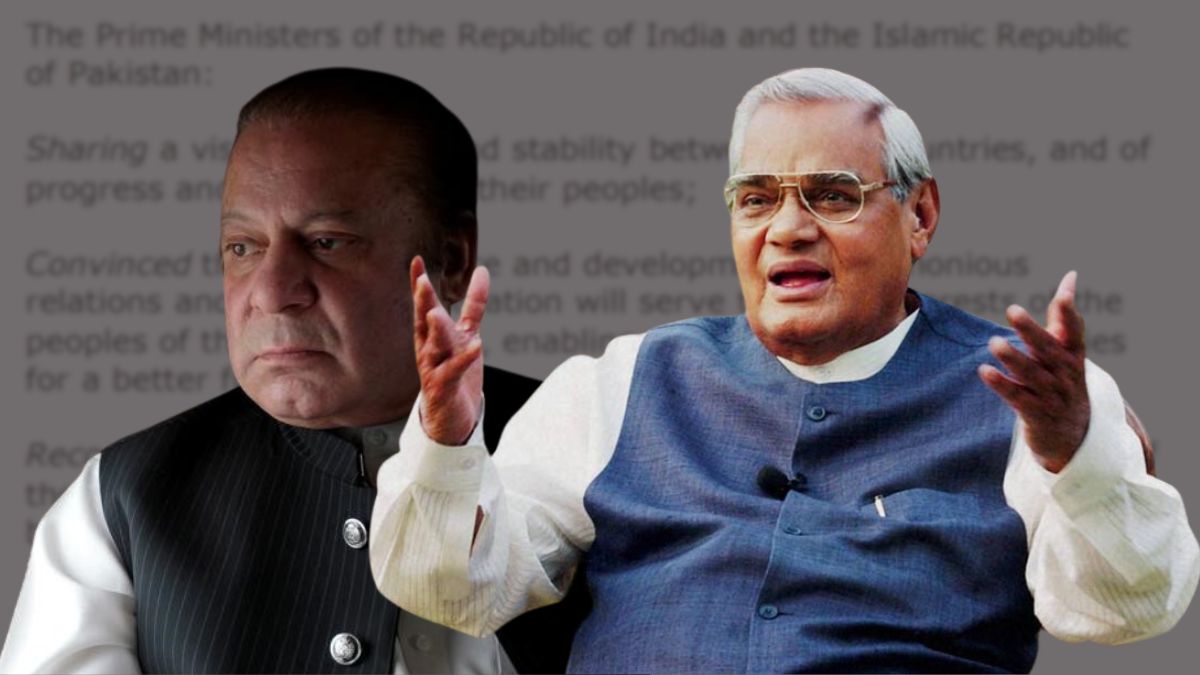In a startling admission, former Pakistani Prime Minister Nawaz Sharif has acknowledged that Pakistan violated a peace agreement signed with India in 1999. Speaking to the PML-N general council on Tuesday, Sharif referred to the signing of the Lahore Declaration and its breach by Islamabad in Kargil. “On May 28, 1998, Pakistan carried out five nuclear tests. After that, [then Indian Prime Minister Atal Bihari] Vajpayee Saheb came here and made an agreement with us. But we violated that agreement…it was our fault,” Sharif said.
The Lahore Declaration, signed on February 21, 1999, was a significant milestone in Indo-Pakistani relations. The agreement was born out of a historic summit aimed at thawing the frosty relations between the two nuclear-armed neighbours.
We take a look at what the Lahore Declaration was all about and how Pakistan violated it.
A vision for peace
The Lahore Declaration was a comprehensive framework designed to address long-standing issues between India and Pakistan. The declaration’s primary objectives included promoting peace and stability.
The text of the Lahore Declaration underscored these aspirations: “The Prime Ministers of the Republic of India and the Islamic Republic of Pakistan, sharing a vision of peace and stability between their countries, and of progress and prosperity for their peoples, convinced that durable peace and development of harmonious relations and friendly cooperation will serve the vital interests of the peoples of the two countries.”
Kashmir, nuclear weapons and everything in between
The Lahore Declaration stressed the following points:
Resolution of the Kashmir issue: Both nations agreed to intensify their efforts to resolve all issues, including the issue of Jammu and Kashmir.
Terrorism: Both leaders reaffirmed their condemnation of terrorism in all its forms and manifestations and expressed their determination to combat this menace.
Dealing with nuclear weapons: India and Pakistan committed to taking immediate steps to reduce the risk of accidental or unauthorised use of nuclear weapons. The declaration emphasised the importance of mutually agreed confidence-building measures to improve the security environment. The two countries also reiterated their commitment towards nuclear disarmament and non-proliferation.
Focus on dialogue: It was agreed to intensify the dialogue process for an early and positive outcome of the agreed bilateral agenda.
Commitment to SAARC goals: The declaration reaffirmed their commitment to the goals and objectives of South Asian Association for Regional Cooperation (SAARC). The aim was to promote the welfare of the people of South Asia and improve their quality of life through accelerated economic growth, social progress, and cultural development.
Protection of human rights: The declaration also committed both nations to promote and protect all human rights and fundamental freedoms.
The breach: Kargil war in 1999
However, the hopes pinned on the Lahore Declaration were soon dashed. Just months after the agreement, the Kargil conflict erupted. In May 1999, Pakistani forces, led by General Pervez Musharraf, infiltrated the Kargil district in Jammu and Kashmir. This aggressive move was a clear violation of the Lahore Declaration, which had called for peaceful resolution of disputes and avoidance of conflict.
Impact Shorts
More ShortsIt is understood that the Pakistan army, an organisation that has almost always been at odds with the democratically-elected leaders and has sought to undermine their power, was behind the move.
Sharif’s recent admission brings a rare acknowledgement of responsibility from a Pakistani leader regarding the Kargil misadventure.
The aftermath
The Kargil conflict resulted in significant military casualties and heightened tensions between India and Pakistan, both of which were nuclear-armed by that time. The breach of the Lahore Declaration derailed the peace process and deepened the mistrust and hatred that has long characterised the India-Pakistan relationship.
In essence, the Lahore Declaration of 1999 is a testament to a moment when India and Pakistan came close to forging a new path towards peace. While its violation led to conflict and mistrust, its objectives remain as relevant as ever. In fact, in 2017, then chief minister of Jammu and Kashmir, Mehbooba Mufti, had asked for the Lahore Declaration to be revived.
The challenge is, and has always been the army in Pakistan. At multiple occasions, including in 1999, this institution has sabotaged the peace process between the two nations brought on by diplomacy.
With inputs from agencies
)